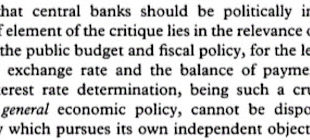The issue is back in the news. This time in Brazil (it was briefly an issue here when Trump did not reappoint Yellen, and then complained about Powell's interest rate where too high). At any rate, I always thought that there were good reasons for skepticism about central bank independence (CBI). As noted by Massimo Pivetti in this old piece on the Maastricht Accord and the, at that time, plan for the euro, the main reason to be doubtful is related to the interaction of monetary policy and...
Read More »John Cochrane Loves the Rule of Law (Some Exceptions Apply)
By William K. Black December 22, 2017 Bloomington, MN As Brad DeLong aptly puts it, John Cochrane was once an economist. Cochrane is now a right wing ideologue surrounded by similar ideologues at Hoover. He is pushing his new chapter in a Hoover book entitled American Exceptionalism in a New Era. His chapter’s title is “Law and the Regulatory State.” I will be writing several articles responding to Cochrane’s chapter, but this first piece concentrates on one key belief that...
Read More »Cochrane Proposes “Restoring the Rule of Law” by Lettide facto ng CEOs Defraud with Impunity
By William K. BlackMay 16, 2016 Bloomington, MN John Cochrane is a theoclassical economist. I struggle to explain to readers how radical theoclassical economics has become. The more their anti-regulatory policies prove disastrous the more extreme their policies become. Cochrane wrote a column recently in the Wall Street Journal that exemplifies this pattern. We are just emerging from the worst financial crisis since the Great Depression. The three “de’s” (deregulation,...
Read More »John Cochrane on economic growth
There are three kinds of lies, "lies, damned lies, and statistics," supposedly said Benjamin Disraeli. This applies to John Cochrane piece in the Wall Street Journal today. Cochrane says that: "Sclerotic growth is America’s overriding economic problem. From 1950 to 2000, the U.S. economy grew at an average rate of 3.5% annually. Since 2000, it has grown at half that rate—1.76%. Even in the years since the bottom of the great recession in 2009, which should have been a time of fast catch-up...
Read More » Heterodox
Heterodox

